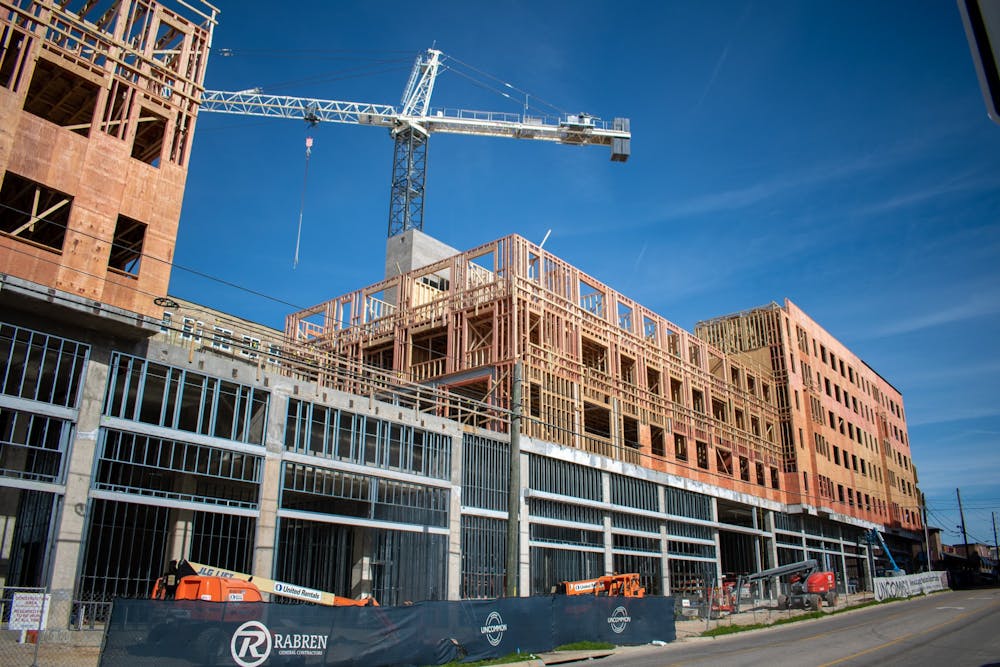Auburn City Council members are expected to vote on a student housing moratorium in the coming weeks with an end date of May 27, 2020, according to the ordinance approved at the January Planning Commission meeting.
The City Council is expected to consider the same ordinance at its Feb. 18 meeting. If approved, the ordinance would put a temporary, 90-day stop to the construction of private dormitories and academic detach dwelling units within Auburn. Both of these types of housing are typically built and intended for student use.
This moratorium comes after over a year of work from the student housing task force, which Mayor Ron Anders created shortly after he was sworn in as mayor in 2018.
“We looked at a lot of different things including having some learning sessions with different groups of students on campus through student affairs at Auburn University,” Anders said at the Dec. 3 City Council meeting.
Council members Jay Hovey and Tommy Dawson served on the task force along with several other community stakeholders, including Auburn University staff.
The end result of several task force meetings was the production, presentation and finalization of a comprehensive student housing inventory, which was completed in November 2019, according to documents given to the Planning Commission for their Jan. 9 meeting.
At the Dec. 3 meeting during the Committee of the Whole Anders asked council members to consider asking city staff to draft a 90-day moratorium ordinance for the Council to vote on. After several Council members asked City Manager Jim Buston some questions, the Council decided to move forward with the moratorium, with the goal that the Council would vote on it at their second December meeting.
The next step was having city staff draft the ordinance. During this process, city attorneys advised staff, who advised Council members, that it was best for the moratorium to go through the Planning Commission and then the Council because of the possible involvement of zoning in the ordinance. Anything that involves zoning, from an annexation into the city or a change to the zoning ordinance, requires the Planning Commission to hear it, according to city code.
That, along with advertising requirements, is how the Council went from looking to vote on the moratorium at their second December meeting, to not hearing it until their second February meeting.
As the mayor explained his plan for the moratorium at the Dec. 3 meeting, he expressed concerns over the number of available student beds in Auburn.
“We’ve got a large number of beds, and we believe that number could be anywhere from 37,000, around that number, of beds that have been dedicated and built for students,” Anders said at the Dec. 3 City Council meeting. “There are some in this room that would argue that the number is greater than that, but we know that it is at least that.”
One concern related to the number of beds available for students already was Auburn University’s formal announcement of an enrollment cap at 25,000 undergraduate students.
Concerns were also raised over the absorption rate of the student beds. According to the 2018 Danter report — which is a student housing study the City commissions every three years — the City could absorb around 400 student beds per year. This means around 400 additional student beds could subsequently be filled every year if the student population continues to grow.
However, the 2018 report took into account that the University would grow by about 500 students per year. With the enrollment cap established in November, that growth number goes way down, likely affecting the absorption rate, Buston said.
“There is an overabundance of student beds in our market,” Buston said. “Or if not an overabundance now, there soon will be an overabundance of beds in the market.”
Anders and Buston agreed that if the 90-day moratorium is approved, city staff would look to get a better understanding of what the absorption rate of student beds is with the enrollment cap in place.
“With 31,000 students and 37,000 beds, I believe that that means that we need to make some determinations and some decisions about is this something that we need to address or not,” Anders said at the Dec. 3 City Council meeting.
The 31,000 number only includes Auburn University undergraduate and graduate students. Anders noted that there are 700 Edward Via College of Osteopathic Medicine, or VCOM, students, as well as a number of Tuskegee University students, who also live in Auburn. They would add to the 31,000, but he does not think those students would bring the number up to match the number of student-built beds.
“It’s my opinion that we are oversubscribed for student housing beds in our community and it’s time for the Council — after a year of study, debate, discussion — to determine whether this is something that we should make a change in,” Anders said at the Dec. 3 City Council meeting.
Anders said he hopes that after the 90-day moratorium, if approved, the Council would have more information on Auburn’s current student housing situation and the city staff would have recommendations for the Council on what, if any, further action should be taken related to student housing.
Do you like this story? The Plainsman doesn't accept money from tuition or student fees, and we don't charge a subscription fee. But you can donate to support The Plainsman.

Elizabeth, senior in journalism and political science, is the community editor for The Plainsman





